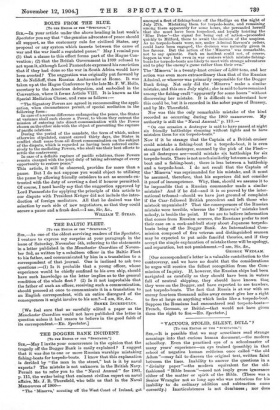SIR,—In your article under the above heading in last week's
Spectator you say that " the genuine advocates of peace should all support, as the customary rule for civilised States, any proposal or any system which inserts between the cause of war and the war itself a regulated pause." May I remind you (1) that a clause to this effect forms part of the Hague Con- vention; (2) that the British Government in 1899 refused to act upon it, although Lord Pauncefote expressed his conviction that if they had done so the war in South Africa would have been averted? The suggestion was originally put forward by M. de Nelidoff, then Russian Ambassador at Rome. It was taken up at the Hague Conference by the late Mr. F. W. Holls, secretary to the American delegation, and embodied in the Convention, where it forms Article VIII. It is known as the Special Mediation Clause, and runs as follows :— " The Signatory Powers are agreed in recommending the appli- cation, when circumstances permit, of special mediation in the following form :
In case of a serious difference endangering the peace, the States at variance shall each choose a Power, to whom they entrust the mission of entering into direct communication with the Power chosen on the other side with the object of preventing the rupture of pacific relations. During the period of the mandate, the term of which, unless otherwise stipulated, cannot exceed thirty days, the States in conflict shall cease from all direct communication on the subject of the dispute, which is regarded as having been referred exclu- sively to the mediating Powers, who shall use their best efforts to settle the controversy.
In case of a definite rupture of pacific relations, these Powers remain charged with the joint duty of taking advantage of every opportunity to restore peace."
This article, it will be observed, provides for more than a pause. But I do not suppose you would object to utilising the pause by allowing friendly outsiders to act as seconds en- trusted with the duty of averting a duel if honour permitted. Of course, I need hardly say that the suggestion approved by Lord Pauncefote for applying the principle of this article to our dispute with President Kruger did not include the intro- duction of foreign mediators. All that he desired was the selection by each side of new negotiators, so that they could secure a pause and a fresh deal.—I am, Sir, &c., WILLIAM T. STEAD.










































 Previous page
Previous page